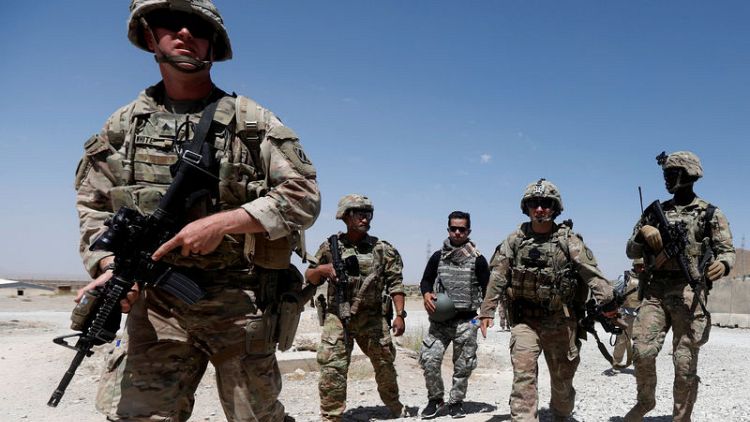By Hamid Shalizi, Rupam Jain and James Mackenzie
KABUL (Reuters) - Afghan officials and America's Western partners reacted with unease on Friday to reports that the United States planned to withdraw more than 5,000 of its 14,000 troops from Afghanistan, after tentative steps towards peace talks.
Although there has been increasing acceptance in Kabul that U.S. President Donald Trump was impatient for progress in ending the 17-year war, comment from a U.S. official that he was planning to withdraw at least 5,000 troops, coupled with the resignation of Defense Secretary Jim Mattis, came as a surprise.
Mattis has been widely seen in Afghanistan as a guarantor of U.S. engagement, and his departure would inevitability raise worries in the minds of many Afghan officials.
The news followed a two-day meeting in Abu Dhabi between U.S. special peace envoy Zalmay Khalilzad and Taliban representatives at which the two sides discussed the withdrawal of international forces and a ceasefire in 2019. [nL3N1YN3FA]
However, with the plans still unconfirmed and further meetings expected in Saudi Arabia in early January, it was unclear whether a ceasefire was close and whether the news heralded a wider settlement.
"The withdrawal will certainly affect overall operations but we will have to wait and see which units are going to go home first. It is too early to say anything for now," said a senior Afghan government official.
"Depending on how the Taliban react, the government might ask forces to reduce operations," he said.
But Haroon Chakansuri, spokesman for President Ashraf Ghani, said the withdrawal would not affect overall security because the role of U.S. forces has been to assist and advise Afghan troops.
The United States has about 14,000 troops in Afghanistan as part of a NATO-led mission, known as Resolute Support, and a separate U.S. counter-terrorism mission largely directed against militant groups like Islamic State and al Qaeda.
In addition, some 8,000 troops from 38 other countries in Resolute Support provide training and support for Afghan forces.
The Taliban are fighting to oust foreign forces and defeat the Western-backed Kabul government.
With the insurgents in control of large stretches of the country and chronically understrength Afghan forces suffering thousands of casualties a month, even a partial U.S. withdrawal could reduce the incentive of the Taliban to strike a deal and erode the willingness of Afghan troops to fight.
"We all know the morale of the Afghan forces has hit an all-time low, they are under-equipped, poorly paid and they lack coordination. We train them to the best of our abilities," said a Western diplomat from a Resolute Support member.
'NO CONSULTATION'
A withdrawal of so many U.S. troops would represent an abrupt shift in U.S. strategy announced a year ago, which saw thousands of troops sent to Afghanistan and air strikes intensified to put pressure on the Taliban to talk.
But for months, diplomats have joked grimly about a "Tweet of Damocles" hanging over Afghanistan - the fear that Trump could take to social media to announce the United States was pulling out.
With the reports from Washington still unconfirmed, there was no comment from the headquarters of the NATO-led mission in Kabul but the news appeared to have caught some allies by surprise.
"The U.S. has not consulted us on the withdrawal and today we will start meetings to discuss it," said one Western diplomat in Kabul.
"It will take a while and there are some countries who are ready to exit. So they could be the first to leave."
Another senior diplomat in Kabul said countries with military or development commitments might now make plans independent of U.S. strategy.
"Each country has to answer this one question: Should we stay in Afghanistan?" the diplomat said.
A senior security official working for an international organization said Afghan officials would be shaken by the news.
"We're keeping a watch on how Afghan elites, policymakers react to this ... Many have been sharing their exit plans with us and now we could see them implement them," the official said.
(Editing by Robert Birsel)
